Report: Context of Business Analysis for Travelodge Manchester Central
VerifiedAdded on 2021/06/10
|18
|4098
|25
Report
AI Summary
This report provides a comprehensive analysis of the business context surrounding the Travelodge Manchester Central hotel. It begins with an executive summary and table of contents, followed by an introduction that sets the stage for the analysis. The core of the report includes a detailed SWOT analysis identifying the hotel's strengths, weaknesses, opportunities, and threats, followed by a PESTEL analysis examining the political, economic, social, technological, legal, and environmental factors impacting the hotel's operations. The report further delves into different leadership styles, including autocratic, bureaucratic, democratic, laissez-faire, and affiliative styles, recommending a participative leadership approach. Finally, the report addresses ethical and social responsibility considerations and concludes with reflections and a conclusion summarizing the key findings and recommendations. The report references relevant academic sources to support its analysis.
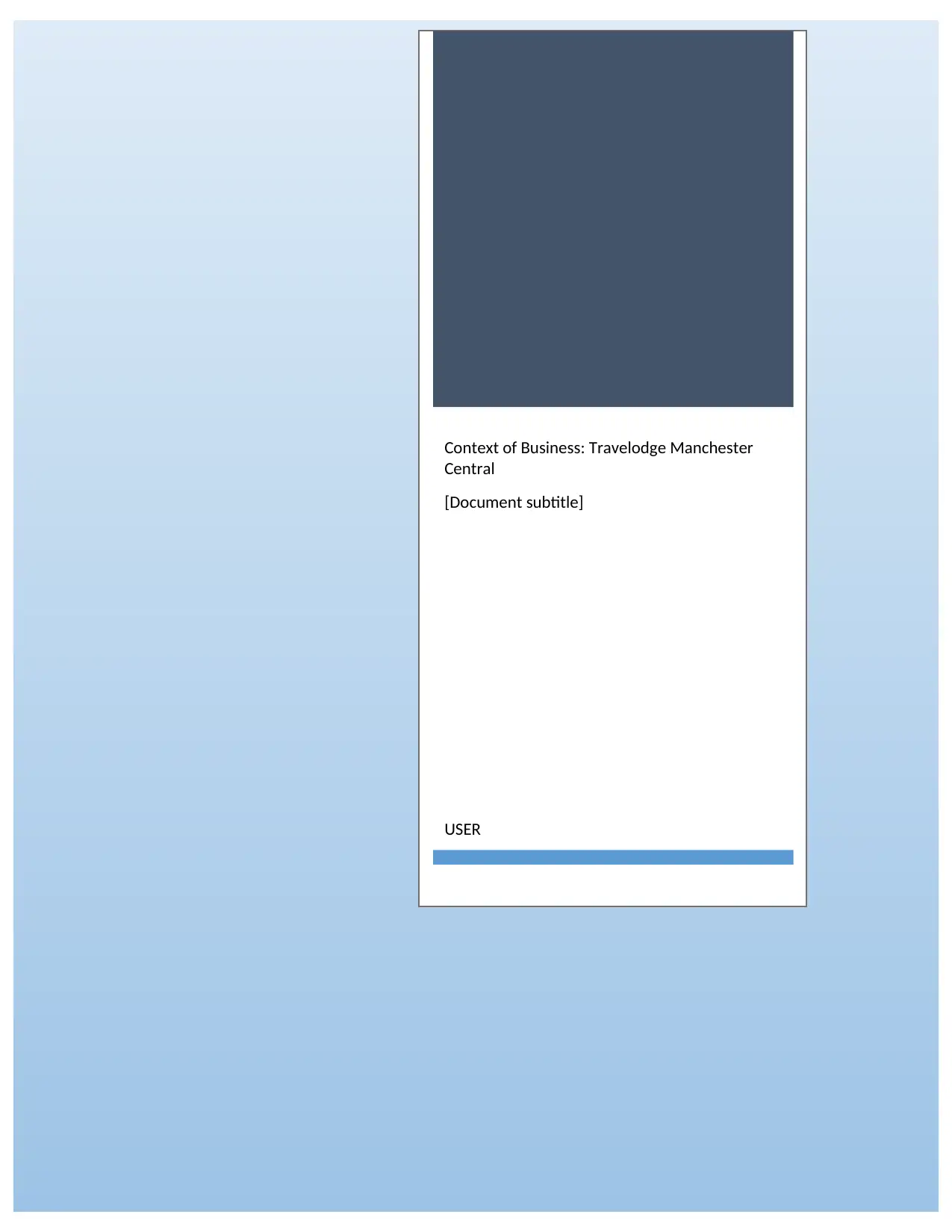
Context of Business: Travelodge Manchester
Central
[Document subtitle]
USER
Central
[Document subtitle]
USER
Paraphrase This Document
Need a fresh take? Get an instant paraphrase of this document with our AI Paraphraser

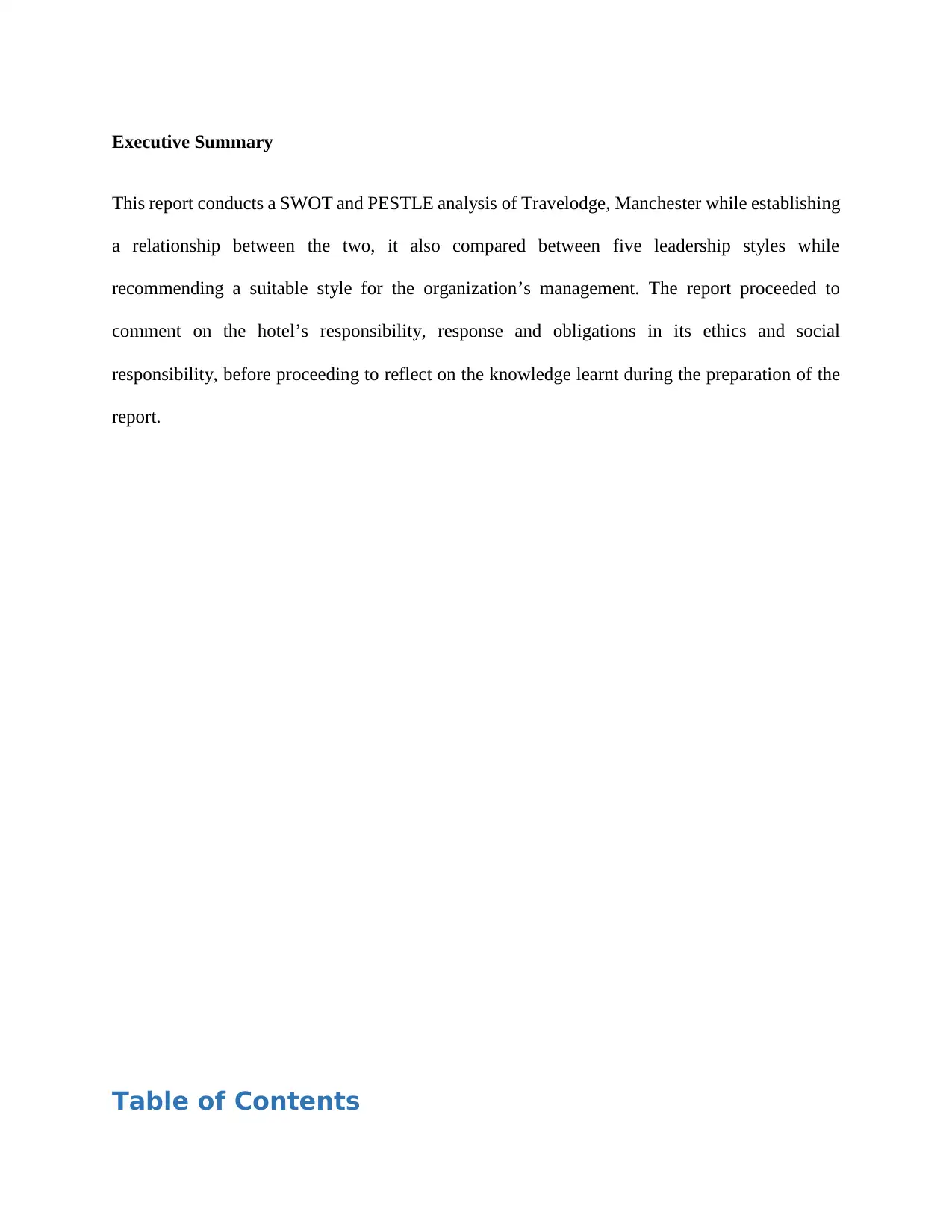
Executive Summary
This report conducts a SWOT and PESTLE analysis of Travelodge, Manchester while establishing
a relationship between the two, it also compared between five leadership styles while
recommending a suitable style for the organization’s management. The report proceeded to
comment on the hotel’s responsibility, response and obligations in its ethics and social
responsibility, before proceeding to reflect on the knowledge learnt during the preparation of the
report.
Table of Contents
This report conducts a SWOT and PESTLE analysis of Travelodge, Manchester while establishing
a relationship between the two, it also compared between five leadership styles while
recommending a suitable style for the organization’s management. The report proceeded to
comment on the hotel’s responsibility, response and obligations in its ethics and social
responsibility, before proceeding to reflect on the knowledge learnt during the preparation of the
report.
Table of Contents
⊘ This is a preview!⊘
Do you want full access?
Subscribe today to unlock all pages.

Trusted by 1+ million students worldwide
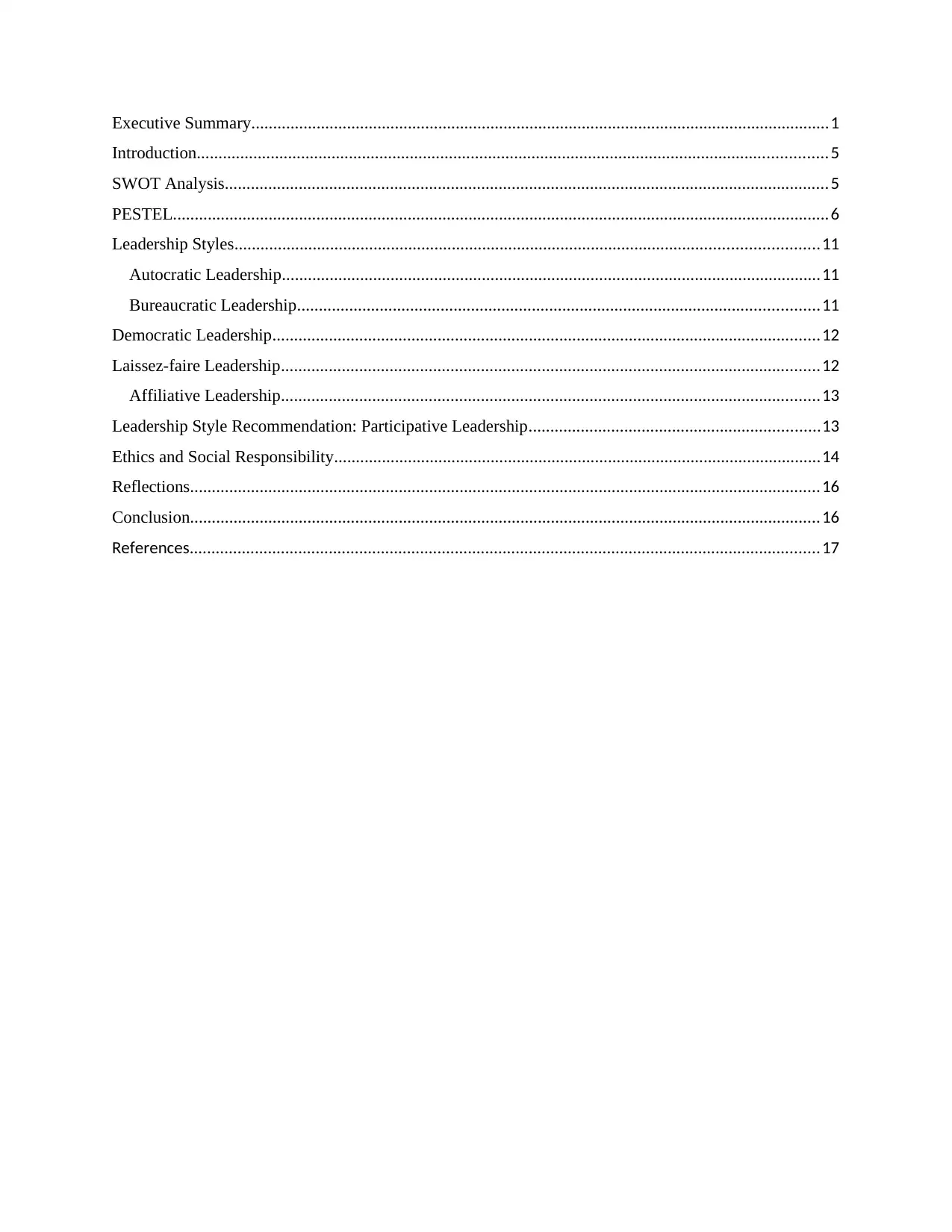
Executive Summary.....................................................................................................................................1
Introduction.................................................................................................................................................5
SWOT Analysis...........................................................................................................................................5
PESTEL.......................................................................................................................................................6
Leadership Styles......................................................................................................................................11
Autocratic Leadership............................................................................................................................11
Bureaucratic Leadership........................................................................................................................11
Democratic Leadership..............................................................................................................................12
Laissez-faire Leadership............................................................................................................................12
Affiliative Leadership............................................................................................................................13
Leadership Style Recommendation: Participative Leadership...................................................................13
Ethics and Social Responsibility................................................................................................................14
Reflections.................................................................................................................................................16
Conclusion.................................................................................................................................................16
References.................................................................................................................................................17
Introduction.................................................................................................................................................5
SWOT Analysis...........................................................................................................................................5
PESTEL.......................................................................................................................................................6
Leadership Styles......................................................................................................................................11
Autocratic Leadership............................................................................................................................11
Bureaucratic Leadership........................................................................................................................11
Democratic Leadership..............................................................................................................................12
Laissez-faire Leadership............................................................................................................................12
Affiliative Leadership............................................................................................................................13
Leadership Style Recommendation: Participative Leadership...................................................................13
Ethics and Social Responsibility................................................................................................................14
Reflections.................................................................................................................................................16
Conclusion.................................................................................................................................................16
References.................................................................................................................................................17
Paraphrase This Document
Need a fresh take? Get an instant paraphrase of this document with our AI Paraphraser
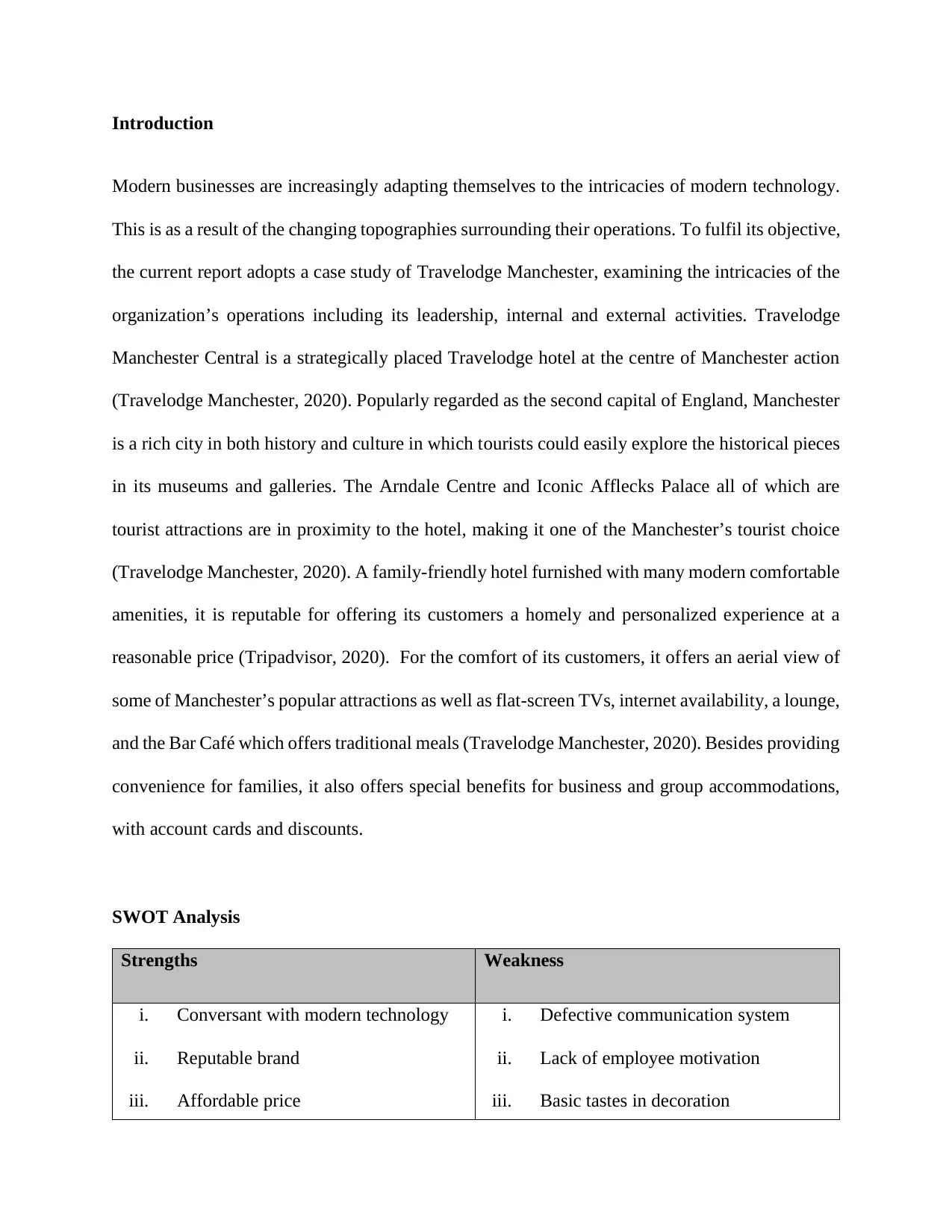
Introduction
Modern businesses are increasingly adapting themselves to the intricacies of modern technology.
This is as a result of the changing topographies surrounding their operations. To fulfil its objective,
the current report adopts a case study of Travelodge Manchester, examining the intricacies of the
organization’s operations including its leadership, internal and external activities. Travelodge
Manchester Central is a strategically placed Travelodge hotel at the centre of Manchester action
(Travelodge Manchester, 2020). Popularly regarded as the second capital of England, Manchester
is a rich city in both history and culture in which tourists could easily explore the historical pieces
in its museums and galleries. The Arndale Centre and Iconic Afflecks Palace all of which are
tourist attractions are in proximity to the hotel, making it one of the Manchester’s tourist choice
(Travelodge Manchester, 2020). A family-friendly hotel furnished with many modern comfortable
amenities, it is reputable for offering its customers a homely and personalized experience at a
reasonable price (Tripadvisor, 2020). For the comfort of its customers, it offers an aerial view of
some of Manchester’s popular attractions as well as flat-screen TVs, internet availability, a lounge,
and the Bar Café which offers traditional meals (Travelodge Manchester, 2020). Besides providing
convenience for families, it also offers special benefits for business and group accommodations,
with account cards and discounts.
SWOT Analysis
Strengths Weakness
i. Conversant with modern technology
ii. Reputable brand
iii. Affordable price
i. Defective communication system
ii. Lack of employee motivation
iii. Basic tastes in decoration
Modern businesses are increasingly adapting themselves to the intricacies of modern technology.
This is as a result of the changing topographies surrounding their operations. To fulfil its objective,
the current report adopts a case study of Travelodge Manchester, examining the intricacies of the
organization’s operations including its leadership, internal and external activities. Travelodge
Manchester Central is a strategically placed Travelodge hotel at the centre of Manchester action
(Travelodge Manchester, 2020). Popularly regarded as the second capital of England, Manchester
is a rich city in both history and culture in which tourists could easily explore the historical pieces
in its museums and galleries. The Arndale Centre and Iconic Afflecks Palace all of which are
tourist attractions are in proximity to the hotel, making it one of the Manchester’s tourist choice
(Travelodge Manchester, 2020). A family-friendly hotel furnished with many modern comfortable
amenities, it is reputable for offering its customers a homely and personalized experience at a
reasonable price (Tripadvisor, 2020). For the comfort of its customers, it offers an aerial view of
some of Manchester’s popular attractions as well as flat-screen TVs, internet availability, a lounge,
and the Bar Café which offers traditional meals (Travelodge Manchester, 2020). Besides providing
convenience for families, it also offers special benefits for business and group accommodations,
with account cards and discounts.
SWOT Analysis
Strengths Weakness
i. Conversant with modern technology
ii. Reputable brand
iii. Affordable price
i. Defective communication system
ii. Lack of employee motivation
iii. Basic tastes in decoration
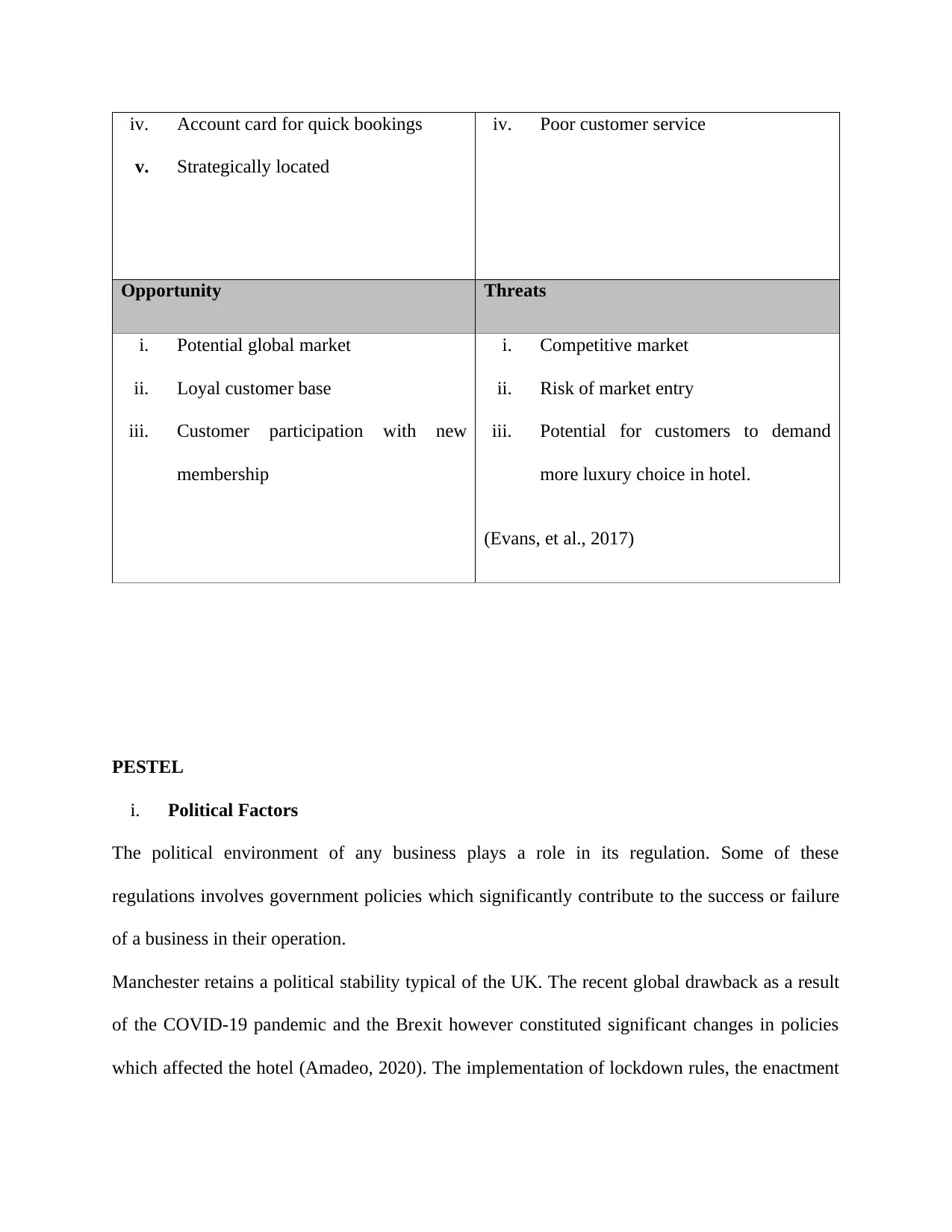
iv. Account card for quick bookings
v. Strategically located
iv. Poor customer service
Opportunity Threats
i. Potential global market
ii. Loyal customer base
iii. Customer participation with new
membership
i. Competitive market
ii. Risk of market entry
iii. Potential for customers to demand
more luxury choice in hotel.
(Evans, et al., 2017)
PESTEL
i. Political Factors
The political environment of any business plays a role in its regulation. Some of these
regulations involves government policies which significantly contribute to the success or failure
of a business in their operation.
Manchester retains a political stability typical of the UK. The recent global drawback as a result
of the COVID-19 pandemic and the Brexit however constituted significant changes in policies
which affected the hotel (Amadeo, 2020). The implementation of lockdown rules, the enactment
v. Strategically located
iv. Poor customer service
Opportunity Threats
i. Potential global market
ii. Loyal customer base
iii. Customer participation with new
membership
i. Competitive market
ii. Risk of market entry
iii. Potential for customers to demand
more luxury choice in hotel.
(Evans, et al., 2017)
PESTEL
i. Political Factors
The political environment of any business plays a role in its regulation. Some of these
regulations involves government policies which significantly contribute to the success or failure
of a business in their operation.
Manchester retains a political stability typical of the UK. The recent global drawback as a result
of the COVID-19 pandemic and the Brexit however constituted significant changes in policies
which affected the hotel (Amadeo, 2020). The implementation of lockdown rules, the enactment
⊘ This is a preview!⊘
Do you want full access?
Subscribe today to unlock all pages.

Trusted by 1+ million students worldwide
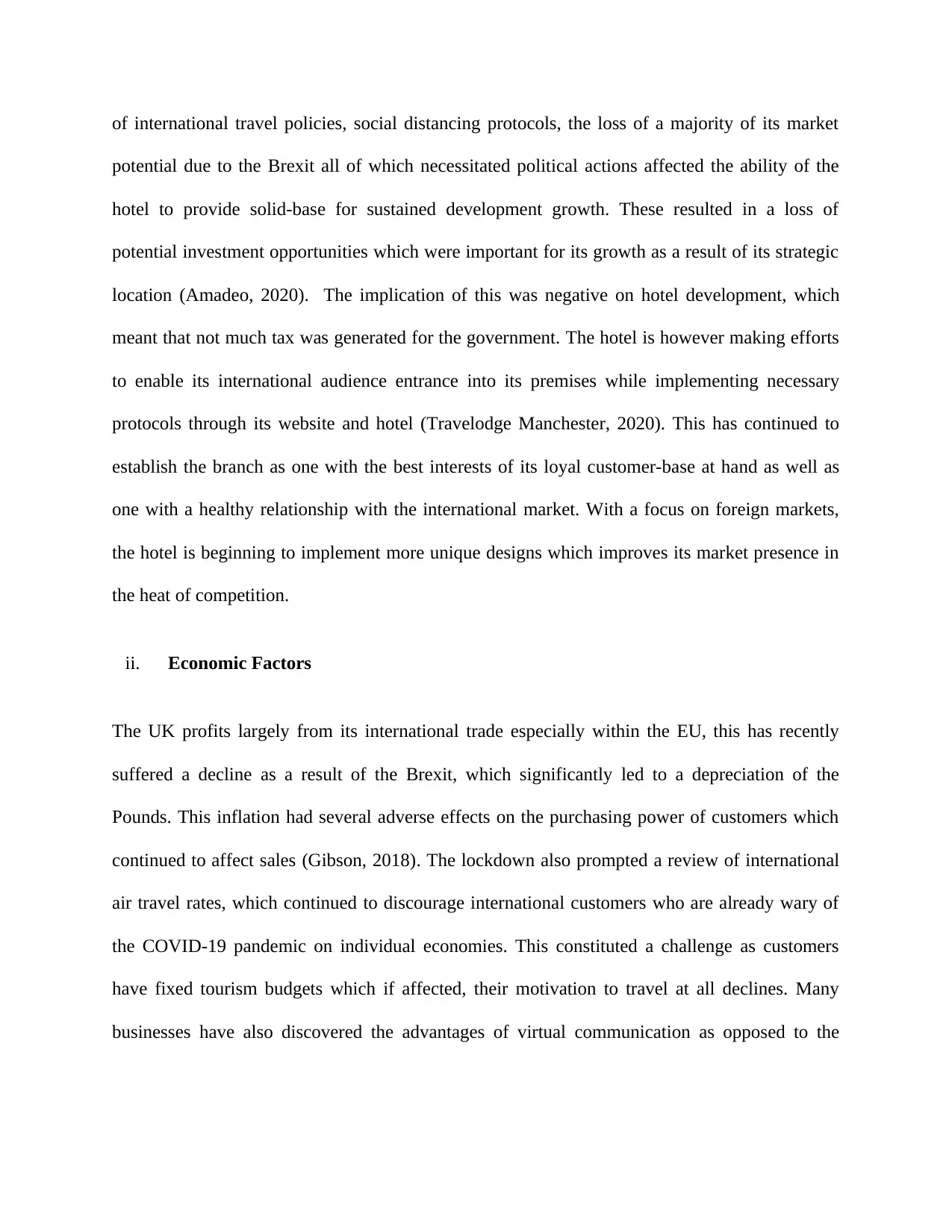
of international travel policies, social distancing protocols, the loss of a majority of its market
potential due to the Brexit all of which necessitated political actions affected the ability of the
hotel to provide solid-base for sustained development growth. These resulted in a loss of
potential investment opportunities which were important for its growth as a result of its strategic
location (Amadeo, 2020). The implication of this was negative on hotel development, which
meant that not much tax was generated for the government. The hotel is however making efforts
to enable its international audience entrance into its premises while implementing necessary
protocols through its website and hotel (Travelodge Manchester, 2020). This has continued to
establish the branch as one with the best interests of its loyal customer-base at hand as well as
one with a healthy relationship with the international market. With a focus on foreign markets,
the hotel is beginning to implement more unique designs which improves its market presence in
the heat of competition.
ii. Economic Factors
The UK profits largely from its international trade especially within the EU, this has recently
suffered a decline as a result of the Brexit, which significantly led to a depreciation of the
Pounds. This inflation had several adverse effects on the purchasing power of customers which
continued to affect sales (Gibson, 2018). The lockdown also prompted a review of international
air travel rates, which continued to discourage international customers who are already wary of
the COVID-19 pandemic on individual economies. This constituted a challenge as customers
have fixed tourism budgets which if affected, their motivation to travel at all declines. Many
businesses have also discovered the advantages of virtual communication as opposed to the
potential due to the Brexit all of which necessitated political actions affected the ability of the
hotel to provide solid-base for sustained development growth. These resulted in a loss of
potential investment opportunities which were important for its growth as a result of its strategic
location (Amadeo, 2020). The implication of this was negative on hotel development, which
meant that not much tax was generated for the government. The hotel is however making efforts
to enable its international audience entrance into its premises while implementing necessary
protocols through its website and hotel (Travelodge Manchester, 2020). This has continued to
establish the branch as one with the best interests of its loyal customer-base at hand as well as
one with a healthy relationship with the international market. With a focus on foreign markets,
the hotel is beginning to implement more unique designs which improves its market presence in
the heat of competition.
ii. Economic Factors
The UK profits largely from its international trade especially within the EU, this has recently
suffered a decline as a result of the Brexit, which significantly led to a depreciation of the
Pounds. This inflation had several adverse effects on the purchasing power of customers which
continued to affect sales (Gibson, 2018). The lockdown also prompted a review of international
air travel rates, which continued to discourage international customers who are already wary of
the COVID-19 pandemic on individual economies. This constituted a challenge as customers
have fixed tourism budgets which if affected, their motivation to travel at all declines. Many
businesses have also discovered the advantages of virtual communication as opposed to the
Paraphrase This Document
Need a fresh take? Get an instant paraphrase of this document with our AI Paraphraser
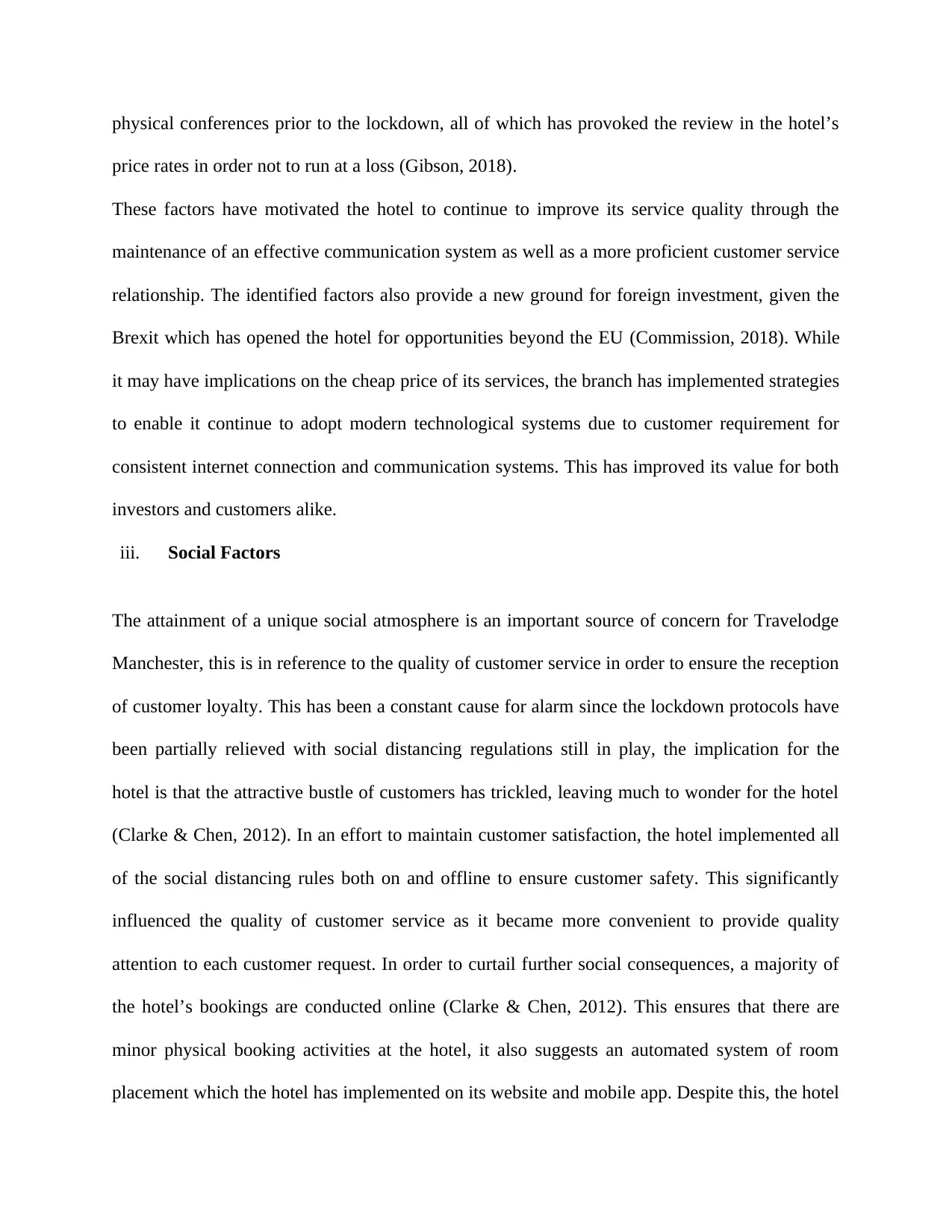
physical conferences prior to the lockdown, all of which has provoked the review in the hotel’s
price rates in order not to run at a loss (Gibson, 2018).
These factors have motivated the hotel to continue to improve its service quality through the
maintenance of an effective communication system as well as a more proficient customer service
relationship. The identified factors also provide a new ground for foreign investment, given the
Brexit which has opened the hotel for opportunities beyond the EU (Commission, 2018). While
it may have implications on the cheap price of its services, the branch has implemented strategies
to enable it continue to adopt modern technological systems due to customer requirement for
consistent internet connection and communication systems. This has improved its value for both
investors and customers alike.
iii. Social Factors
The attainment of a unique social atmosphere is an important source of concern for Travelodge
Manchester, this is in reference to the quality of customer service in order to ensure the reception
of customer loyalty. This has been a constant cause for alarm since the lockdown protocols have
been partially relieved with social distancing regulations still in play, the implication for the
hotel is that the attractive bustle of customers has trickled, leaving much to wonder for the hotel
(Clarke & Chen, 2012). In an effort to maintain customer satisfaction, the hotel implemented all
of the social distancing rules both on and offline to ensure customer safety. This significantly
influenced the quality of customer service as it became more convenient to provide quality
attention to each customer request. In order to curtail further social consequences, a majority of
the hotel’s bookings are conducted online (Clarke & Chen, 2012). This ensures that there are
minor physical booking activities at the hotel, it also suggests an automated system of room
placement which the hotel has implemented on its website and mobile app. Despite this, the hotel
price rates in order not to run at a loss (Gibson, 2018).
These factors have motivated the hotel to continue to improve its service quality through the
maintenance of an effective communication system as well as a more proficient customer service
relationship. The identified factors also provide a new ground for foreign investment, given the
Brexit which has opened the hotel for opportunities beyond the EU (Commission, 2018). While
it may have implications on the cheap price of its services, the branch has implemented strategies
to enable it continue to adopt modern technological systems due to customer requirement for
consistent internet connection and communication systems. This has improved its value for both
investors and customers alike.
iii. Social Factors
The attainment of a unique social atmosphere is an important source of concern for Travelodge
Manchester, this is in reference to the quality of customer service in order to ensure the reception
of customer loyalty. This has been a constant cause for alarm since the lockdown protocols have
been partially relieved with social distancing regulations still in play, the implication for the
hotel is that the attractive bustle of customers has trickled, leaving much to wonder for the hotel
(Clarke & Chen, 2012). In an effort to maintain customer satisfaction, the hotel implemented all
of the social distancing rules both on and offline to ensure customer safety. This significantly
influenced the quality of customer service as it became more convenient to provide quality
attention to each customer request. In order to curtail further social consequences, a majority of
the hotel’s bookings are conducted online (Clarke & Chen, 2012). This ensures that there are
minor physical booking activities at the hotel, it also suggests an automated system of room
placement which the hotel has implemented on its website and mobile app. Despite this, the hotel
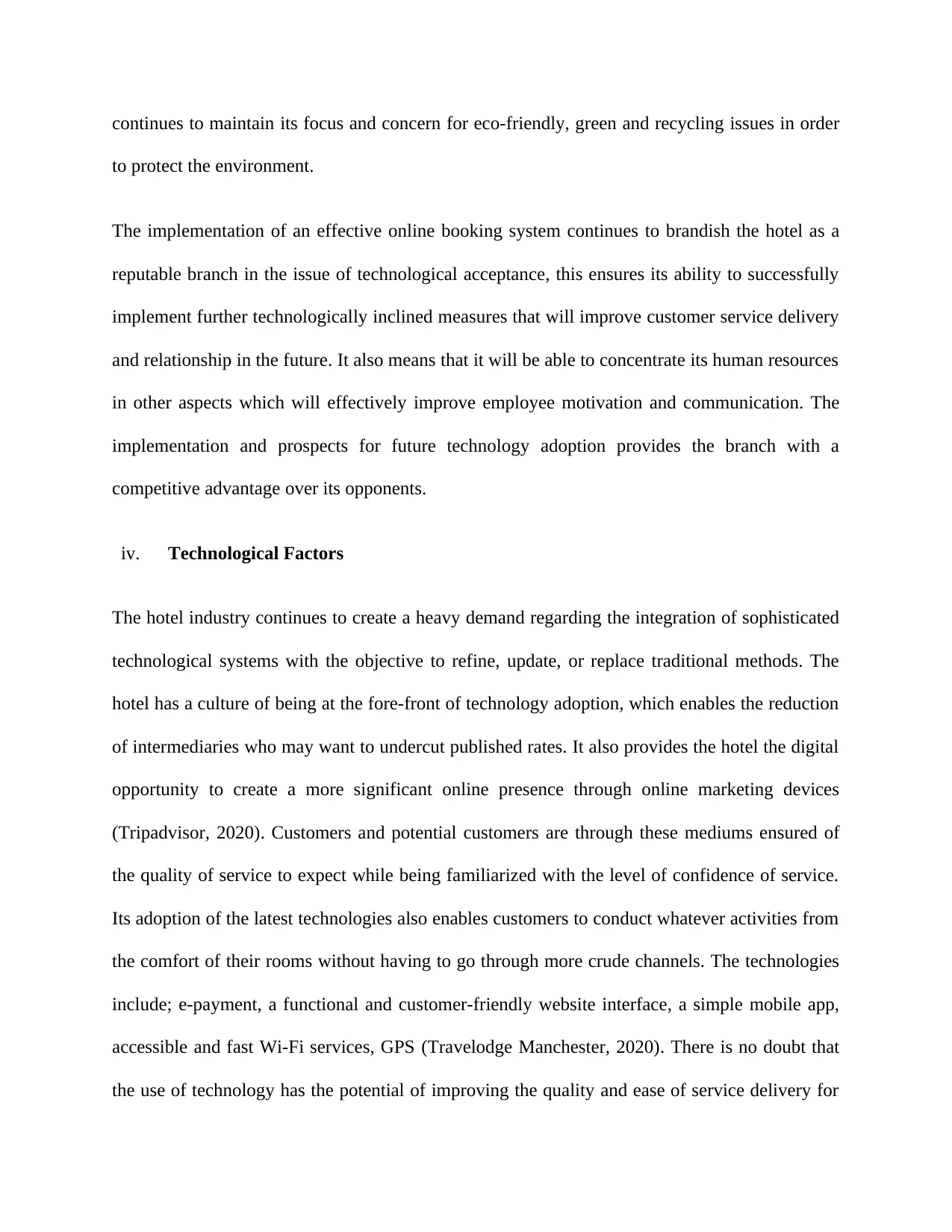
continues to maintain its focus and concern for eco-friendly, green and recycling issues in order
to protect the environment.
The implementation of an effective online booking system continues to brandish the hotel as a
reputable branch in the issue of technological acceptance, this ensures its ability to successfully
implement further technologically inclined measures that will improve customer service delivery
and relationship in the future. It also means that it will be able to concentrate its human resources
in other aspects which will effectively improve employee motivation and communication. The
implementation and prospects for future technology adoption provides the branch with a
competitive advantage over its opponents.
iv. Technological Factors
The hotel industry continues to create a heavy demand regarding the integration of sophisticated
technological systems with the objective to refine, update, or replace traditional methods. The
hotel has a culture of being at the fore-front of technology adoption, which enables the reduction
of intermediaries who may want to undercut published rates. It also provides the hotel the digital
opportunity to create a more significant online presence through online marketing devices
(Tripadvisor, 2020). Customers and potential customers are through these mediums ensured of
the quality of service to expect while being familiarized with the level of confidence of service.
Its adoption of the latest technologies also enables customers to conduct whatever activities from
the comfort of their rooms without having to go through more crude channels. The technologies
include; e-payment, a functional and customer-friendly website interface, a simple mobile app,
accessible and fast Wi-Fi services, GPS (Travelodge Manchester, 2020). There is no doubt that
the use of technology has the potential of improving the quality and ease of service delivery for
to protect the environment.
The implementation of an effective online booking system continues to brandish the hotel as a
reputable branch in the issue of technological acceptance, this ensures its ability to successfully
implement further technologically inclined measures that will improve customer service delivery
and relationship in the future. It also means that it will be able to concentrate its human resources
in other aspects which will effectively improve employee motivation and communication. The
implementation and prospects for future technology adoption provides the branch with a
competitive advantage over its opponents.
iv. Technological Factors
The hotel industry continues to create a heavy demand regarding the integration of sophisticated
technological systems with the objective to refine, update, or replace traditional methods. The
hotel has a culture of being at the fore-front of technology adoption, which enables the reduction
of intermediaries who may want to undercut published rates. It also provides the hotel the digital
opportunity to create a more significant online presence through online marketing devices
(Tripadvisor, 2020). Customers and potential customers are through these mediums ensured of
the quality of service to expect while being familiarized with the level of confidence of service.
Its adoption of the latest technologies also enables customers to conduct whatever activities from
the comfort of their rooms without having to go through more crude channels. The technologies
include; e-payment, a functional and customer-friendly website interface, a simple mobile app,
accessible and fast Wi-Fi services, GPS (Travelodge Manchester, 2020). There is no doubt that
the use of technology has the potential of improving the quality and ease of service delivery for
⊘ This is a preview!⊘
Do you want full access?
Subscribe today to unlock all pages.

Trusted by 1+ million students worldwide
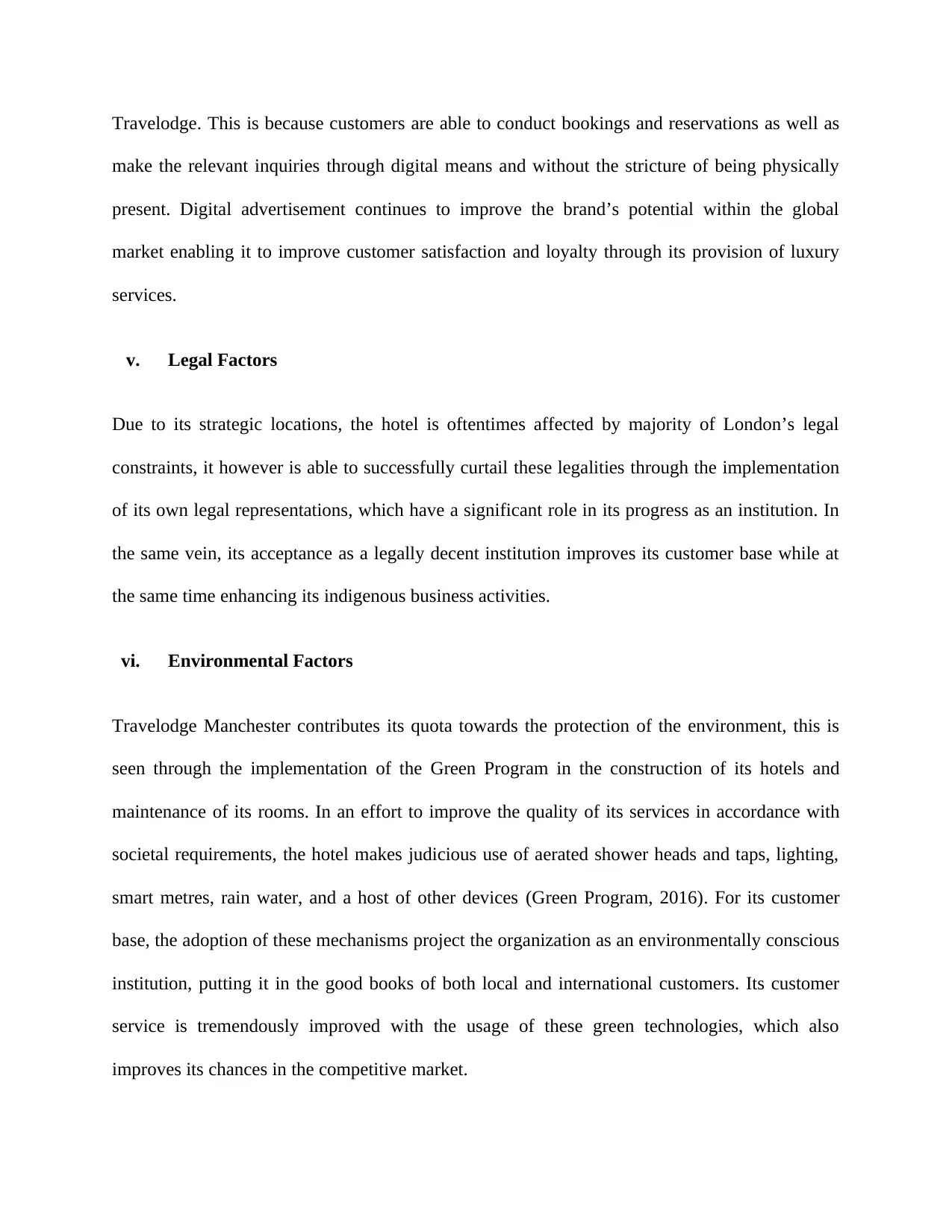
Travelodge. This is because customers are able to conduct bookings and reservations as well as
make the relevant inquiries through digital means and without the stricture of being physically
present. Digital advertisement continues to improve the brand’s potential within the global
market enabling it to improve customer satisfaction and loyalty through its provision of luxury
services.
v. Legal Factors
Due to its strategic locations, the hotel is oftentimes affected by majority of London’s legal
constraints, it however is able to successfully curtail these legalities through the implementation
of its own legal representations, which have a significant role in its progress as an institution. In
the same vein, its acceptance as a legally decent institution improves its customer base while at
the same time enhancing its indigenous business activities.
vi. Environmental Factors
Travelodge Manchester contributes its quota towards the protection of the environment, this is
seen through the implementation of the Green Program in the construction of its hotels and
maintenance of its rooms. In an effort to improve the quality of its services in accordance with
societal requirements, the hotel makes judicious use of aerated shower heads and taps, lighting,
smart metres, rain water, and a host of other devices (Green Program, 2016). For its customer
base, the adoption of these mechanisms project the organization as an environmentally conscious
institution, putting it in the good books of both local and international customers. Its customer
service is tremendously improved with the usage of these green technologies, which also
improves its chances in the competitive market.
make the relevant inquiries through digital means and without the stricture of being physically
present. Digital advertisement continues to improve the brand’s potential within the global
market enabling it to improve customer satisfaction and loyalty through its provision of luxury
services.
v. Legal Factors
Due to its strategic locations, the hotel is oftentimes affected by majority of London’s legal
constraints, it however is able to successfully curtail these legalities through the implementation
of its own legal representations, which have a significant role in its progress as an institution. In
the same vein, its acceptance as a legally decent institution improves its customer base while at
the same time enhancing its indigenous business activities.
vi. Environmental Factors
Travelodge Manchester contributes its quota towards the protection of the environment, this is
seen through the implementation of the Green Program in the construction of its hotels and
maintenance of its rooms. In an effort to improve the quality of its services in accordance with
societal requirements, the hotel makes judicious use of aerated shower heads and taps, lighting,
smart metres, rain water, and a host of other devices (Green Program, 2016). For its customer
base, the adoption of these mechanisms project the organization as an environmentally conscious
institution, putting it in the good books of both local and international customers. Its customer
service is tremendously improved with the usage of these green technologies, which also
improves its chances in the competitive market.
Paraphrase This Document
Need a fresh take? Get an instant paraphrase of this document with our AI Paraphraser
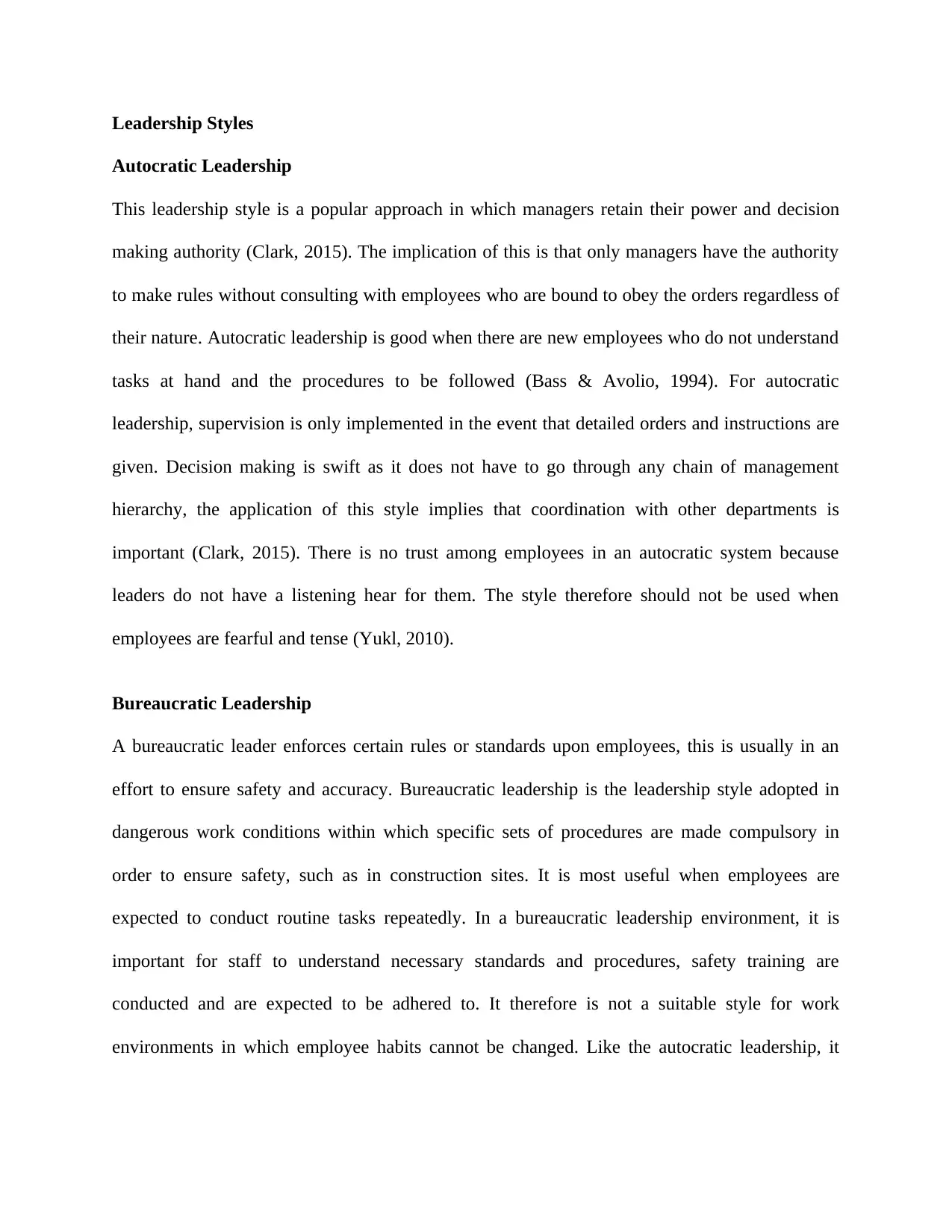
Leadership Styles
Autocratic Leadership
This leadership style is a popular approach in which managers retain their power and decision
making authority (Clark, 2015). The implication of this is that only managers have the authority
to make rules without consulting with employees who are bound to obey the orders regardless of
their nature. Autocratic leadership is good when there are new employees who do not understand
tasks at hand and the procedures to be followed (Bass & Avolio, 1994). For autocratic
leadership, supervision is only implemented in the event that detailed orders and instructions are
given. Decision making is swift as it does not have to go through any chain of management
hierarchy, the application of this style implies that coordination with other departments is
important (Clark, 2015). There is no trust among employees in an autocratic system because
leaders do not have a listening hear for them. The style therefore should not be used when
employees are fearful and tense (Yukl, 2010).
Bureaucratic Leadership
A bureaucratic leader enforces certain rules or standards upon employees, this is usually in an
effort to ensure safety and accuracy. Bureaucratic leadership is the leadership style adopted in
dangerous work conditions within which specific sets of procedures are made compulsory in
order to ensure safety, such as in construction sites. It is most useful when employees are
expected to conduct routine tasks repeatedly. In a bureaucratic leadership environment, it is
important for staff to understand necessary standards and procedures, safety training are
conducted and are expected to be adhered to. It therefore is not a suitable style for work
environments in which employee habits cannot be changed. Like the autocratic leadership, it
Autocratic Leadership
This leadership style is a popular approach in which managers retain their power and decision
making authority (Clark, 2015). The implication of this is that only managers have the authority
to make rules without consulting with employees who are bound to obey the orders regardless of
their nature. Autocratic leadership is good when there are new employees who do not understand
tasks at hand and the procedures to be followed (Bass & Avolio, 1994). For autocratic
leadership, supervision is only implemented in the event that detailed orders and instructions are
given. Decision making is swift as it does not have to go through any chain of management
hierarchy, the application of this style implies that coordination with other departments is
important (Clark, 2015). There is no trust among employees in an autocratic system because
leaders do not have a listening hear for them. The style therefore should not be used when
employees are fearful and tense (Yukl, 2010).
Bureaucratic Leadership
A bureaucratic leader enforces certain rules or standards upon employees, this is usually in an
effort to ensure safety and accuracy. Bureaucratic leadership is the leadership style adopted in
dangerous work conditions within which specific sets of procedures are made compulsory in
order to ensure safety, such as in construction sites. It is most useful when employees are
expected to conduct routine tasks repeatedly. In a bureaucratic leadership environment, it is
important for staff to understand necessary standards and procedures, safety training are
conducted and are expected to be adhered to. It therefore is not a suitable style for work
environments in which employee habits cannot be changed. Like the autocratic leadership, it
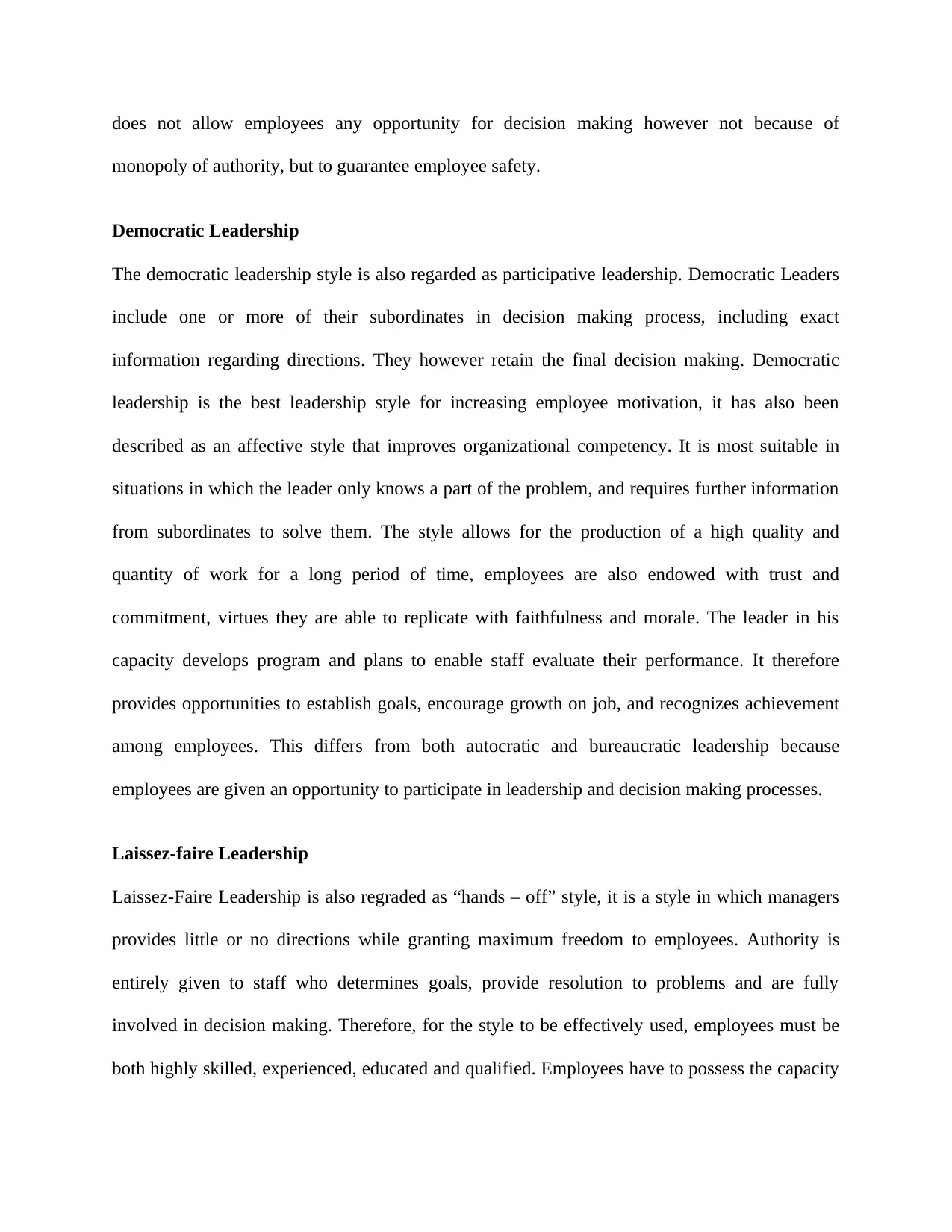
does not allow employees any opportunity for decision making however not because of
monopoly of authority, but to guarantee employee safety.
Democratic Leadership
The democratic leadership style is also regarded as participative leadership. Democratic Leaders
include one or more of their subordinates in decision making process, including exact
information regarding directions. They however retain the final decision making. Democratic
leadership is the best leadership style for increasing employee motivation, it has also been
described as an affective style that improves organizational competency. It is most suitable in
situations in which the leader only knows a part of the problem, and requires further information
from subordinates to solve them. The style allows for the production of a high quality and
quantity of work for a long period of time, employees are also endowed with trust and
commitment, virtues they are able to replicate with faithfulness and morale. The leader in his
capacity develops program and plans to enable staff evaluate their performance. It therefore
provides opportunities to establish goals, encourage growth on job, and recognizes achievement
among employees. This differs from both autocratic and bureaucratic leadership because
employees are given an opportunity to participate in leadership and decision making processes.
Laissez-faire Leadership
Laissez-Faire Leadership is also regraded as “hands – off” style, it is a style in which managers
provides little or no directions while granting maximum freedom to employees. Authority is
entirely given to staff who determines goals, provide resolution to problems and are fully
involved in decision making. Therefore, for the style to be effectively used, employees must be
both highly skilled, experienced, educated and qualified. Employees have to possess the capacity
monopoly of authority, but to guarantee employee safety.
Democratic Leadership
The democratic leadership style is also regarded as participative leadership. Democratic Leaders
include one or more of their subordinates in decision making process, including exact
information regarding directions. They however retain the final decision making. Democratic
leadership is the best leadership style for increasing employee motivation, it has also been
described as an affective style that improves organizational competency. It is most suitable in
situations in which the leader only knows a part of the problem, and requires further information
from subordinates to solve them. The style allows for the production of a high quality and
quantity of work for a long period of time, employees are also endowed with trust and
commitment, virtues they are able to replicate with faithfulness and morale. The leader in his
capacity develops program and plans to enable staff evaluate their performance. It therefore
provides opportunities to establish goals, encourage growth on job, and recognizes achievement
among employees. This differs from both autocratic and bureaucratic leadership because
employees are given an opportunity to participate in leadership and decision making processes.
Laissez-faire Leadership
Laissez-Faire Leadership is also regraded as “hands – off” style, it is a style in which managers
provides little or no directions while granting maximum freedom to employees. Authority is
entirely given to staff who determines goals, provide resolution to problems and are fully
involved in decision making. Therefore, for the style to be effectively used, employees must be
both highly skilled, experienced, educated and qualified. Employees have to possess the capacity
⊘ This is a preview!⊘
Do you want full access?
Subscribe today to unlock all pages.

Trusted by 1+ million students worldwide
1 out of 18
Related Documents
Your All-in-One AI-Powered Toolkit for Academic Success.
+13062052269
info@desklib.com
Available 24*7 on WhatsApp / Email
![[object Object]](/_next/static/media/star-bottom.7253800d.svg)
Unlock your academic potential
Copyright © 2020–2026 A2Z Services. All Rights Reserved. Developed and managed by ZUCOL.





